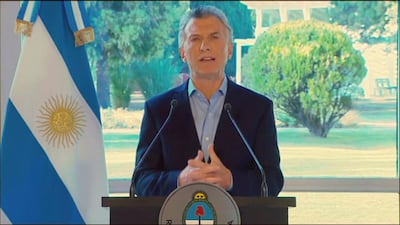Argentinian President Mauricio Macri announced plans for salary rises and tax cuts on Wednesday after voters turned against his austerity policies, sparking days of economic turmoil as the peso crashed.
Mr Macri, who is seeking re-election in October, said he would cut income taxes for workers, increase subsidies and introduce a 90-day freeze on fuel prices to help ease the economic shock.
He also announced an unspecified increase in the monthly minimum wage, currently at 12,500 pesos (Dh762), saying it would benefit two million workers.
But the president's announcement did little to immediately ease market concerns, with the peso slipping more than 6 per cent to close at 62.18 to the dollar.
The drop means the Argentinian currency has lost more than a quarter of its value since Friday.
Mr Macri said the measures would "benefit 17 million workers and their families and all small and medium-sized businesses, formal and informal, state and private".
He said the package of measures, which would cost the state $665 million, would "relieve the pockets" of Argentines hit by 55 per cent inflation.
Mr Macri was dealt a huge blow in his bid for re-election when he polled 15 points less than centre-left Peronist candidate Alberto Fernandez in Sunday's primary elections, which served as a bellwether for the general elections in October.
Mr Fernandez, now firm favourite to unseat Mr Macri in the election on October 27, said the measures smacked of desperation.
"It's like an atheist who takes to prayer before dying. It doesn't work," he told Argentina's El Destape Radio.
Mr Macri said in a message released before markets opened: "My task is to ensure governance.
"Dialogue is the only way. Uncertainty has caused a lot of damage and forces us to be responsible. I want to convey peace of mind in this electoral process that has begun."
To that end, the embattled president held talks in the afternoon with Mr Fernandez, tweeting that they had "a good and long conversation".
He said his leftist rival had "pledged to collaborate in all possible areas to ensure that this electoral process, and the uncertainty, affects the economy as little as possible".
Earlier, a contrite Mr Macri, who has slashed subsidies and trimmed the public sector since his election in 2015, acknowledged that what he had asked of Argentines "was very difficult, like climbing Aconcagua", Argentina's highest mountain.
He said he wanted to relieve a weary electorate.
"Getting to the end of the month became an impossible task," Mr Macri said. "Many families had to cut their expenses."
Under the new measures, workers will receive extra salary payments in September and October, equal to about $33.
The unemployed will receive extra child benefits and civil servants and the security forces will get a one-off bonus of $83.
Small and medium-sized businesses hit by Argentina's recently turmoil will be allowed to pay treasury debts over the course of a 10-year plan to alleviate their hardship.
The measures "reflects the need to focus on those segments of the population who have been most significantly affected by the country's economic crisis, and who overwhelmingly turned their back on the president during the recent primaries", said Argentine expert Paula Garcia Tufro of the Atlantic Council.
"It reflects the need to win at least some of those voters, namely those representing workers and their families, back by taking tangible steps to address their needs."
Mr Macri's popularity has plunged since a currency crisis last year in which the peso lost half its value against the dollar, and a much-criticized $56 billion International Monetary Fund bail-out loan that analysts say may now have to be restructured.
"We think it's likely that IMF will request a restructuring as a condition of future loan tranches," Capital Economics said.
The next IMF disbursement is due on September 15. The fund has so far refrained from commenting publicly on the primary results.
Argentina is in a recession and posted 22 per cent inflation for the first half of the year, one of the highest rates in the world.

